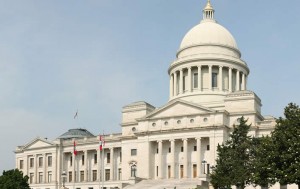Arkansas Legislators Undermining Local Control of Water – SB762

American Legislative Exchange Council (ALEC) is at it again.
Unbelievable!
Kill SB762.
Privatization…just what does it mean?
If you’re wondering why the legislators are attempting to interfere with local control of cities and counties, look no further. American Legislative Exchange Council (ALEC) has just formed a new group called American City County Exchange (ACCE). This new group will seek to duplicate their current influence which they have with the state legislatures all the way down to city and county governments.
So, move over, Association of Arkansas Counties (AAC) and Arkansas Municipal League; there’s a new player in town attempting to take over and eliminate your organization and your job! (If you’ve read our past articles, you know that we don’t support AAC or the Arkansas Municipal League because they’re unelected, unaccountable non-governmental organizations [NGOs], BUT it’s possible that we’re going from bad to worse with ACCE.)
ACCE has two groups of membership: a public sector and a private sector:
-
public sector is $100.00 for two years; this is for city and county officials
-
private sector is for corporate members, and their membership fee is:
-
$10,000 for a Council Committee membership and
-
$25,000 for a Founders Committee membership
ACCE will be pairing up lawmakers with business groups to craft model legislation for the cities and counties.
The model legislation for SB762 was provided by American Legislative Exchange Council (ALEC), and the bill itself is sponsored by ALEC member Senator Alan Clark. Senator Clark’s Bio showing his membership to ALEC can be found by clicking here.
What’s wrong with this legislation? SB762 is an attempt by the Arkansas legislators and ACCE to take away the water providers’ authority over their own water supplies. This time, the Arkansas legislators are attempting to force the local water providers to extend water service to non-resident consumers and property owners. This is another one of those unfunded mandates coming from the Arkansas legislators that could bankrupt rural Arkansas because of the forced expense of serving everyone that requests the water extended. This is an example of a Public-Private Partnership (PPP)!
Who do you think is behind all this? Did rural Arkansas ask for the Arkansas legislators to get involved in their job as water providers? No, they didn’t! Again – ALEC wrote the model legislation.
There is a lot of money to be made in local government, and it appears that the ALEC legislative members are attempting to cash in on it!
ALEC is behind the privatizing of many government entities. Education, prisons, and water are examples.
Education: How are corporations undermining K-12 public education through these ALEC bills?
Prisons: The Hidden History of ALEC and Prison Labor.
Water: World Bank wants water to be privatized.
Here is an example of why you do NOT want to do water privatization. Some of the reasons to oppose water privatization are:
-
Privatization could lead to rate increases
-
Privatization could undermine water quality
-
Privatized companies would only be accountable to shareholders, not consumers
-
Privatization would foster corruption
-
Privatization would reduce local control and public rights
-
Private financing costs more than government financing
-
Privatization could lead to local job losses
-
Privatization would be difficult to reverse
-
Privatization could open the door to massive water exports
-
Privatization could lead to water rationing
-
Privatization could lead to tracking with smart meters
-
Privatization could affect how agencies enforce the regulations
ALEC has some model legislation called “Environmental Services Public-Private Partnership ACT”. This legislation provides an arrangement through which government utilizes the private sector to produce goods and services that would otherwise be provided or funded completely by government. You can bet the consumer will foot this inflated tab! And Corporate America will stand to make billions of dollars!
Could this lead to water rationing? Secure Arkansas believes it could! Here is another link covering water restrictions in some other parts of the country.
SB762 passed in the Senate by a vote of 22 Yeas, 10 Nays, 1 Not Voting, and 1 Present. To see how the Senate voted, click here. It is apparent that most of the legislators voting Yea for the bill did NOT read the bill, or they sold out to ALEC! Looks like they have most of the Senate in their back pocket, and that is why our legislators aren’t listening to the people anymore. Could this be the reason our senate is locked up this session?
The status of SB762 can be found by clicking here.
This bill must now be killed in the House to prevent the possibility of the privatization of the public water supplies, which ALEC and its corporate members evidently covet (among other things). See the ALEC model legislation bill listed above. We’ve included the entire bill below with our comments.
===== SB762 is below with Secure Arkansas’ comments in highlighted text =====
State of Arkansas
90th General Assembly A Bill
Regular Session, 2015 SENATE BILL 762
By: Senator A. Clark
For An Act To Be Entitled
AN ACT TO REQUIRE WATER PROVIDERS TO EXTEND WATER SERVICE TO NONRESIDENT CONSUMERS AND PROPERTY OWNERS; AND FOR OTHER PURPOSES.
SB762 is encouraging our local water systems to fail, so that they can be taken over and privatized.
Subtitle
TO REQUIRE WATER PROVIDERS TO EXTEND WATER SERVICE TO NONRESIDENT CONSUMERS AND PROPERTY OWNERS.
BE IT ENACTED BY THE GENERAL ASSEMBLY OF THE STATE OF ARKANSAS:
SECTION 1. Arkansas Code Title 14, Chapter 229, Subchapter 1, is amended to add an additional section to read as follows:
14-229-105. Water providers — Services to nonresident property owners or consumers.
(a)(1) A water provider in this state shall provide services to a nonresident property owner or consumer whose property lies within the water provider-accepted service area if requested by the nonresident property owner or consumer, except as provided under this section.
Here the legislators are taking away local control from the water providers and forcing them to provide service to nonresident property owners. This will be costly to the water provider.
(2) A water provider shall supply the same amount of water and water pressure to resident property owners or consumers and nonresident property owners or consumers if infrastructure exists to do so, but a water provider is not obligated to increase the number or size of, or change the location of, mains or pipes outside its boundaries.
This demand will also be very costly to the water provider. The complete infrastructure will have to be changed in order to maintain the same pressure at the end of the water main as at the beginning of the water main.
(3)(A) Water shall be supplied to resident property owners or consumers and nonresident property owners or consumers at rates the water provider deems just and reasonable.
Who will be in charge to determine if the water rate is just and reasonable?
(B)(i) A water provider may establish separate rate classifications for resident property owners or consumers and nonresident property owners or consumers with reasonable justification.
Who will determine if the rate classifications are reasonable justification?
(ii) The water provider shall treat all property owners or consumers within a rate classification equally.
(b)(1) A water provider shall provide services to a nonresident property owner or consumer at the request of the nonresident property owner or consumer if:
Again, this would take away local control from the water providers and force them to provide water services to nonresident property owners. This would result in higher costs to the water provider.
(A) The nonresident property owner or consumer does not have access to any other water service;
(B) The nonresident property owner or consumer resides in a water improvement district that:
(i) Has installed water lines or other infrastructure; and
(ii) Has deeded the infrastructure to the water provider, and the water provider has accepted the infrastructure with no requirement for annexation;
(C) Infrastructure to supply services exists at the time of the request; and
(D) The nonresident property owner or consumer provides any necessary pipes or structures to access the water provider infrastructure.
(2) Resident property owners or consumers and nonresident property owners or consumers who seek water or receive water service for agricultural, developmental, or industrial purposes shall be treated equally in relation to any water conservation measures.
In the line the above, both property owners and nonresident property owners are to be treated the same when it comes to water conservation. This will have a negative impact on any agricultural, development, or industrial industry.
(c) Except for emergency measures established by rule and promulgated by the Department of Health, a water provider shall treat all property owners and consumers equally in terms of service, including without limitation:
(1) The provision of water; and
(2) The availability of new service.
==== SB762 is shown above with Secure Arkansas’ comments in highlighted text ====
Arkansas Representatives: PLEASE vote NO on SB762. It’s a bad bill. YOU MUST READ THE WHOLE BILL before you decide. Don’t just read the title or summary of the bill!
Secure Arkansas supporters: Call these representatives, please! Especially Rep. Betty Overbey, the CHAIR of the City, County and Local Affairs Committee in the House, as well as the legislators on the City, County and Local Affairs Committee in the House. The bill is headed to that committee tomorrow morning, Weds, March 25, 2015 at 10:00 a.m! Check here for updates.)
Tell them you want them to vote “NO” on SB762 because it goes against local control of our water!
Directly below the table are the email addresses for the 20 Representatives in the City, County & Local Affairs Committee, in case you’d like to copy and paste them to email them all at one time.
Please notify Secure Arkansas about the responses you receive from your representatives.
|
Title |
Name |
Phone |
|
District |
|
Representative |
Mary Bentley |
73 |
||
|
Representative |
Charles Blake |
36 |
||
|
Representative |
Justin Boyd |
77 |
||
|
Representative |
Donnie Copeland |
38 |
||
|
Representative |
Gary Deffenbaugh |
79 |
||
|
Representative |
Jana Della Rosa |
90 |
||
|
Representative |
Lance Eads |
not available |
88 |
|
|
Representative |
Les Eaves |
46 |
||
|
Representative |
Kenneth B. Ferguson |
16 |
||
|
Representative |
David Fielding |
5 |
||
|
Representative |
Justin Gonzales |
19 |
||
|
Representative |
Michael John Gray |
47 |
||
|
Representative |
Kim Hammer |
28 |
||
|
Representative |
Ken Henderson |
71 |
||
|
Representative |
Monte Hodges |
55 |
||
|
Representative |
Tim Lemons |
43 |
||
|
Representative |
Milton Nicks, Jr. |
50 |
||
|
Representative |
Betty Overbey |
69 |
||
|
Representative |
Warwick Sabin |
33 |
||
|
Representative |
Nelda Speaks |
100 |
betty.overbey@arkansashouse.
charles.blake@arkansashouse.
david.fielding@arkansashouse.
donnie.copeland@arkansashouse.
gary.deffenbaugh@
kenneth.ferguson@
mary.bentley@arkansashouse.org
michael.gray@arkansashouse.org
milton.nicks@arkansashouse.org
monte.hodges@arkansashouse.org
Be sure to forward this email to your family and friends!
They may also sign up to receive our Action Alerts by clicking here.
Our freedom and local control of water are important!
Securing the blessings of liberty,
Secure Arkansas
securetherepublic.com/arkansas
info@securetherepublic.com
